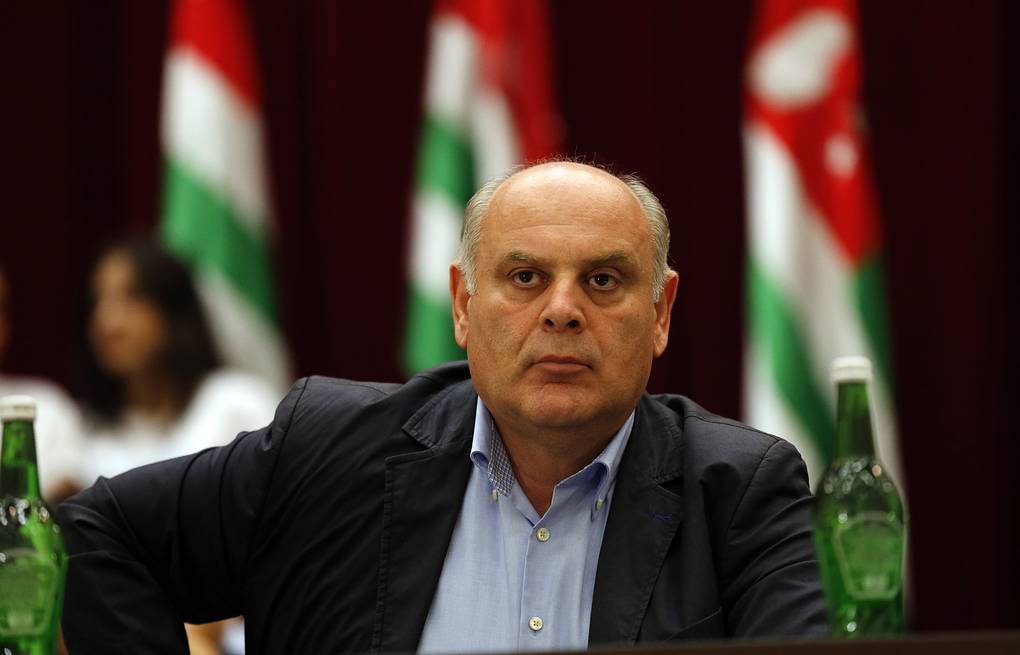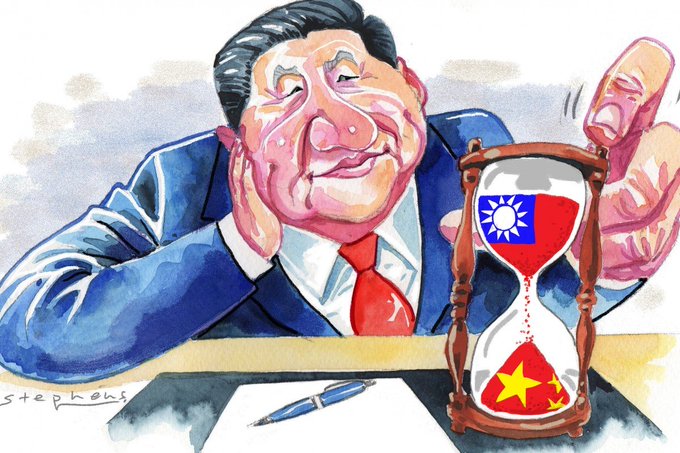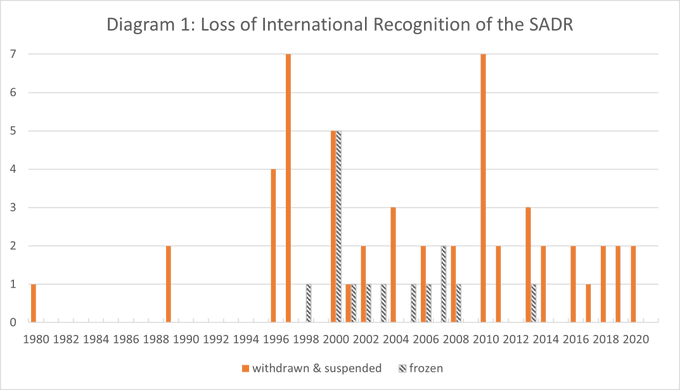Is the Current Political Crisis in Abkhazia an Opportunity for Dialogue with Georgia?
The ongoing political crisis in Abkhazia that saw the ousting of President Khajimba on January 12, 2020 has many parallels with the crisis in 2014. Both started in public disappointment with the incumbent president, escalated by protesters storming the presidential administration, continued through Russia’s mediation, and concluded with the stepping down of the incumbent president. However, while Russia’s role and even its actors have largely stayed the same, things seem to be changing in Abkhazia, where the opposition leader Aslan Bzhania has called for dialogue with Georgia, surprising both domestic and foreign audiences.
Abkhazia’s tumultuous politics
Since winning the military conflict with Georgia in 1992-93, Abkhazia has been a de facto independent, yet unrecognized state. After the August war between Russia and Georgia in 2008, Russia recognized Abkhazia and South Ossetia. Only a handful countries followed suit, and today Abkhazia remains internationally largely unrecognized, isolated, and heavily dependent on Moscow in the provision of security and funds. Georgia continues to claim Abkhazia as part of its territory and the conflict between the two sides was long deemed ‘frozen’. The current political crisis in Abkhazia is a good opportunity to dispel the myth of the frozen conflict, analyse Abkhazia’s internal dynamics, and consider their impact on Abkhaz-Georgian relations.
The latest political upheaval in Abkhazia is the result of an escalation that started during last year’s presidential election. Aslan Bzhania, a former Head of the State Security Service and opposition candidate, was tipped to win the election scheduled for July 21, 2019. In May, however, he had suddenly fallen gravely ill, with his supporters accusing President Khajimba, and his government, for his poisoning. Hundreds of protesters in the streets of Sukhum/i demanded that elections be delayed to enable Bzhania to recover. The Parliament rejected the petition and the election took place as scheduled. In the second round, Raul Khajimba won by a tiny margin of 1.22% against Alkhas Kvitsinia, who – like the poisoned Bzhania – was supported by the opposition Amtsakhara party. This, however, has proved to be a Pyrrhic victory for Khajimba as allegations of election-rigging and public discontent grew.
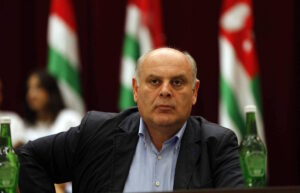
Aslan Bzhania campaigning before being poisoned. Source of the image: JAM News.
Arrival of Bzhania, return of Surkov, departure of Khajimba
Discontent continued to brew for four months following the elections. On January 9, 2020 it reached a boiling point when a group of protesters stormed the Presidential Administration in Sukhum/i, prompting President Raul Khajimba to flee. That night, Bzhania arrived to Abkhazia from treatment in Moscow, joining the protests and further galvanizing the opposition forces in their demands to annul the results of the presidential election. The tide seemed to be turning against Khajimba on the next day as Abkhazia’s Supreme Court recused one of the judges due to a conflict of interests – a key opposition demand.
After two more days of protests and Khajimba’s meeting with the opposition – brokered by Russians Vladislav Surkov, an adviser to President Vladimir Putin and Rashid Nurgaliyev, the deputy secretary of Russia’s National Security Council – Raul Khajimba resigned on January 12 and March 22, 2020 was set as the date the new presidential election will be held.
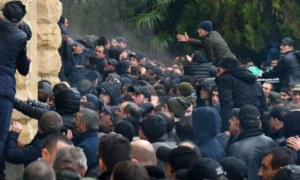
January 2020 protests in Abkhazia. Source of the image: 112 Agency.
Three observations
Based on the recent developments and the ongoing political crisis in Abkhazia, three observations can be made. First, the deep causes of the current political crisis in Abkhazia are in public dissatisfaction with political elites and grim economic prospects. While the triggers of the recent protests were the poisoning of the lead candidate and the questioning of election results, the roots of the protests lie in Abkhazians’ disillusionment with economic stagnation, increasing lawlessness, and the alleged links between the ruling politicians and organized crime (Khajimba’s bodyguard was recently detained on homicide charges). Khajimba was seen as weak, bowing to Russia without being able to get much in return as Russian financial aid to the de facto state declined in recent years.
Second, Russia has had to act as mediator in Abkhazia for the second time in six years. Neither Russia’s money (which forms the majority of Abkhazia’s budget) nor political patronage to local politicians, have managed to tackle public discontentment in Abkhazia (and the latter might have fuelled it). In order to prevent instability, Russia is increasingly compelled to micro-manage the situation and act as a mediator not only between Georgia and Abkhazia (a role it is happy to play), but among the political players in the latter (which is a distraction from more important foreign policy priorities). Parallels can be drawn between the recent protests that unseated Khajimba and the protests that led to resignation of Alexander Ankvab in 2014. During both, President Putin dispatched his advisor Vladislav Surkov, former chief ideologist and author of the term sovereign democracy, to manage the situation. And it was precisely Surkov who helped Khajimba become president after ousting Ankvab only to see himself ousted six years later. However, unlike in 2014, this time Russia did not actively remove the incumbent president.
Third, unlike Ankvab’s resignation in 2014, Khajimba’s ousting was not organised by Moscow. Instead, it was his failure to deliver on promises such as to create a more inclusive presidential administration, and to conduct a political transition from a presidential to parliamentary system. Russia has military bases in Abkhazia as well as large political and economic leverage in the de facto state. Abkhazia is often portrayed as an authoritarian ‘puppet’ of Moscow with little agency of its own. And while fears of ‘Ossetianization’ are not unfounded, the recent events have shown how unpredictable local politics in Abkhazia can be while political mobilisation points to a relatively small, but active civil society. Far from pulling all the strings, Russian policy makers sometimes seem to be caught off guard by events in Abkhazia.
Unexpected opportunity for dialogue?
Perhaps the most unexpected result of the current political crisis in Abkhazia is the seemingly renewed interest in Georgian-Abkhazian dialogue from both sides. Since the ouster of Khajimba, Bzhania has called for direct talks with Tbilisi and Georgian Reconciliation Minister Ketevan Tsikhelashvili has welcomed the initiative. The dialogue currently takes place through the framework of the Geneva International Discussions (GID). These include the UN, the OSCE, and the EU as the three co-chairs, representatives from Russia and Georgia and ‘participants’ from Abkhazia and South Ossetia. After small successes in the early rounds, the progress within the GID has stalled, with much of the disagreement being over the format itself and the status of actors involved. The format of negotiations accords lower status to Abkhazians and South Ossetians – they are not considered representatives due to objections of Georgia, which claims that the conflict is between itself and Russia. Therefore, it is all the more surprising, that in his call for dialogue, Bzhania stated: “there must be dialogue. In what form, in what format, this does not matter.” In Abkhazia, calling for a dialogue with Georgia is neither common nor unheard of. A veteran politician Sergei Shamba, Abkhazia’s longest-serving foreign minister, recently called for a normalization of relations. However, Bzhania’s statement does break with a precedent of Abkhazia attaching so much importance to the format of negotiations and its equal status within them. While Moscow has not publicly reacted to Bzhania’s call for dialogue, his readiness to normalise relations has caused concern in South Ossetia and Bzhania was asked to clarify his position in domestic media. In Georgia, the responses to Bzhania’s call to dialogue have been diverse. Alexander Khojanovishvili, deputy head of the Georgian Security Service, and Paata Zakareishvili, a former Reconciliation Minister rejected the possibility of direct dialogue. However, Georgian Prime Minister Giorgi Gakharia has stated that the dialogue is “critically important”.
Bzhania, who is currently in Sochi and still undergoing treatment for his poisoning, is the favourite to win the elections on March 22, 2020. If he does, this might be a new opportunity to re-start talks between Tbilisi and Sukhum/i. However, the situation is still quite volatile and in the past, bouts of surprise, excitement, and optimism have often fallen victim to pragmatic political calculations. Abkhazian politics are quite far from those of a puppet state trapped in a frozen conflict – what it is often portrayed to be. Although Russia will surely play a key role in any attempt to restart a dialogue between Abkhazia and Georgia, it does not want to get bogged down in increasingly frequent interventions and micro-management.
Author: Urban Jakša


